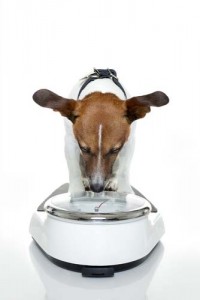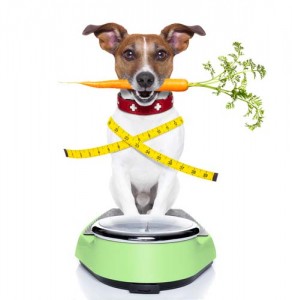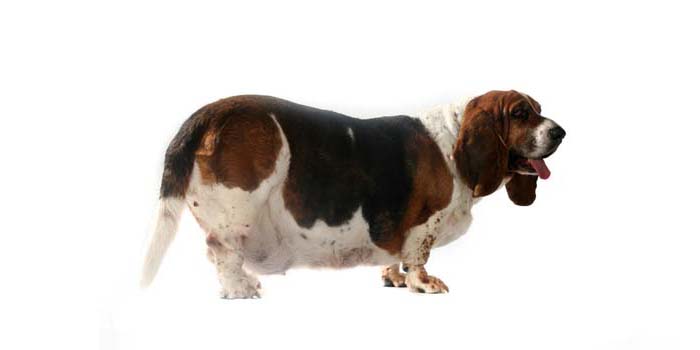 Canine obesity is a growing epidemic and it is just as dangerous as obesity in humans. If a human is overweight, they can make changes to their lifestyle to quickly shed a few pounds. Unfortunately, it is up to us to manage the weight of our pets. That means if your dog is overweight or obese, you're the only one that can help him. The longer you wait, the more severe the health effects will be. Obesity could ultimately take years off your dog's life.
Canine obesity is a growing epidemic and it is just as dangerous as obesity in humans. If a human is overweight, they can make changes to their lifestyle to quickly shed a few pounds. Unfortunately, it is up to us to manage the weight of our pets. That means if your dog is overweight or obese, you're the only one that can help him. The longer you wait, the more severe the health effects will be. Obesity could ultimately take years off your dog's life.
This week I had the pleasure of speaking with Dr. Chessie Green, owner and working veterinarian at Falls Village Veterinary Hospital in Raleigh, North Carolina about this topic. As a vet, she has seen first hand how quickly the pet obesity epidemic is growing. For some dogs, it's the diet they are fed; others don't get enough exercise.
Medical conditions, like thyroid problems, can cause weight gain or loss as well. No matter what caused your dog's condition, it's imperative that you act quickly to help him shed the extra pounds. A trip to your vet to discuss a weight management plan should be your first step.
READ ALSO: The Best Weight Loss Dog Food for Fat Dogs
Interview: The Risks of Canine Obesity and How To Keep Your Dog Fit
How to tell if your dog is overweight
When discussing pet obesity, the first thing you need to know is how to tell if your dog is overweight. Dr. Green says the easiest way to tell is by feeling your dog's ribs. You should be able to easily feel you pet's rib bones without having to push through a layer of fat.
You should only be able to feel your dog's ribs – not see them. If you can clearly see his rib bones, it may be a sign that he is underweight, which can be just as serious as being overweight.
You can also tell by your dog's appearance. If you look down at your dog from directly above, you should be able to see a little bit of an hourglass waist. You'll notice slight indentations between your dog's hip bones and his rib cage. If you don't see any indentation at all, it's a good sign that your dog is overweight.
RELATED: How to Motivate An Overweight Dog
You also want to be sure your dog doesn't have a big belly. Older pets tend to have a little bit of a bigger belly, but in general there should be a slight curve from the chest to the flank area. If you're looking at your dog from a profile view, you should notice that his belly is lower near his chest and rises slightly up to the flank area.
If your dog is very fluffy, Dr. Green recommends looking at his profile stance while he's in the bathtub. The water will weigh down his fur, making it easier to see if there is a curve or not.
These tips can be used for all dog breeds, and cats too! It's actually better to use these visual ques than it is to use specific weight guidelines. Although you can find an average weight for most breeds, every dog's body is different and canines come in so many different varieties. For this reason, every dog has his own ideal weight.
What do I do if my dog is overweight?
 Of course, diet and exercise are the keys to losing weight. If you notice that your dog is overweight, Dr. Green says that you should consult with your veterinarian before changing his diet. Like people, every dog has specific dietary needs. Just because one diet worked for another dog, doesn't mean it will work for yours.
Of course, diet and exercise are the keys to losing weight. If you notice that your dog is overweight, Dr. Green says that you should consult with your veterinarian before changing his diet. Like people, every dog has specific dietary needs. Just because one diet worked for another dog, doesn't mean it will work for yours.
It may not be the amount of food that you're feeding that is the problem. Maybe it's the type of food or maybe the type of dog food you've selected is just what your pet needs, but you're giving him too much. Your dog's diet may be fine. It might just be that he needs a little more exercise.
RELATED: 4 Different Types of Dog Food and Which One Your Dog Needs?
Either way, it's best to consult your vet before making any changes. This will rule out any medical conditions causing the weight gain, and ensure that it's your dog's diet that needs to be changed. Cutting back the amount of food that you're feeding your dog could end up causing malnutrition if that isn't the issue.
Dog treats can also play a major role in canine obesity. Dr. Green told me that five Milkbone treats are equivalent to one meal! If you're giving your dog five of those treats over the course of two days, you'll end up feeding him the equivalent of three additional meals every week.
Feeding fewer dog treats, switching your pet's treats to vegetables or switching to a healthier treat brand with fewer calories are all good ways to curb this problem. Dr. Green reminds her patients' owners that dog's don't quantify treats the way we do. Your pet only realizes that he's getting a treat – he doesn't notice if it's smaller than the last treat he received.
Things to consider
 Puppies tend to have a chubbier belly than adult dogs. This is normal, so don't worry. Dr. Green explains it like human children. They are chubbier as babies, but as they age they thin out. Your puppy should do the exact same thing.
Puppies tend to have a chubbier belly than adult dogs. This is normal, so don't worry. Dr. Green explains it like human children. They are chubbier as babies, but as they age they thin out. Your puppy should do the exact same thing.
Senior dogs tend to gain weight as they get older. Their metabolism slows and their energy level decreases. Dr. Green says that you should consult with your vet if you notice your senior dog gaining weight. It's likely that his diet may need to be changed, and you'll probably have to cut back on his treats.
RELATED: 6 Vet's Tips on How to Care for Senior Dogs
Exercise is also crucial for senior pets. Many older dogs suffer from arthritis, but the best thing you can do for an arthritic dog is to keep him moving. Exercise will actually help ease the pain of arthritis and his joints won't be so stiff.
Dr. Green cited the very well-known study done by the Purina Pet Institute that followed 48 Labrador retrievers. Some of the dogs were kept at an ideal weight, while others were allowed to be a bit overweight. The study found that on average, the dogs who maintained an ideal weight lived two years longer than the overweight dogs.
Dr. Green also explained to me that Purina does a lot of research on canine health and nutrition. She always recommends their website as a great resource for pet parents.
If you allow your dog to stay overweight for a long period of time, he may develop severe health conditions because of it. These may include:
- diabetes
- back pain
- arthritis in the knees, hips and elbows
- lethargy
- heavy panting
- thyroid problems
- digestive problems
If you're already seeing these conditions occurring in your overweight pet, it's not too late to help him. If he slims down now, the problems likely will not go away, but it will significantly reduce the severity of the issues. It is likely to reduce the need for medications to control the problem.
Also, remember that rapid weight gain or loss can be indicative of underlying health problems. If your pet's routine has been relatively the same, and he seems to be gaining or losing weight quickly, you need to schedule an appointment with your veterinarian immediately to find out what is going on.














